8 Ways to Deodorize and Clean Carpet Smells Naturally
We all know that carpets can be a cozy addition to any home, but when you have kids, pets, and limited time, it can be tough to keep them looking and smelling their best. That’s why I’ve put together this guide on how to deodorize and clean carpet smells naturally, including 8 of the best at-home solutions to tackle those lingering odors and freshen up your floors.
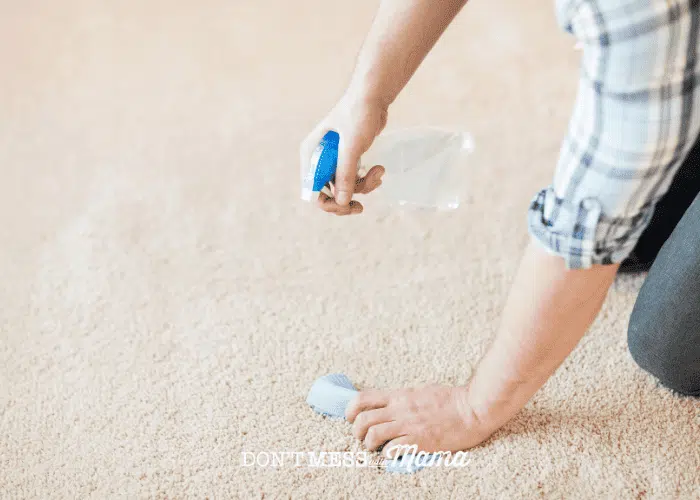
This post contains affiliate links. Please read my affiliate disclosure.
You’ve maybe used carpet deodorizing powders or sprays in the past but these store-bought solutions contain hazardous chemicals like bleach, ammonia, and chlorine. They are also notorious for just masking odors instead of eliminating them. All while using toxic fragrances that can be causing more harm than good. By learning how to deodorize and clean carpet smells naturally, you’ll improve the lifespan of your carpets as well as avoid exposing your family to toxic chemicals.
When it comes to cleaning carpets, the affected area and type of carpet are crucial factors to consider. Different carpet fibers require different approaches, so it’s important to know what you’re dealing with. While a professional carpet cleaner can help in severe cases, trying these DIY methods first can save both time and money.
Whether you’re dealing with pet accidents, water damage, or just generally an unpleasant smell, I’ve got you covered. As well as exploring how to deodorize carpets naturally, I’ll share how to make carpet freshener at home and when to let the professionals intervene. From enzyme cleaners and vinegar solutions to baking soda and vodka – discover the secrets to banishing those smelly carpet woes using ingredients already in your home.
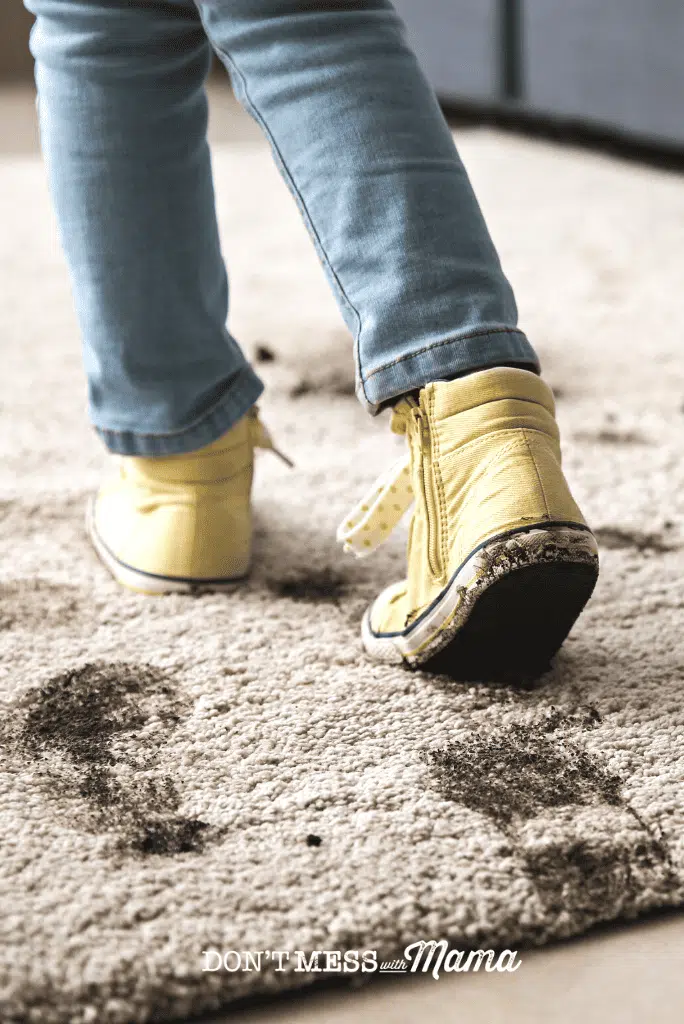
Why Carpets Smell
Before you can find the perfect solution for your smelly carpet, it’s essential to consider the cause. There are a few reasons why you’re struggling with unpleasant odors from your carpet, this includes:
- Food and drinks – If you spill food or drink (especially those with strong smells or staining properties eg. wine) they can seep into the carpet fibers and underlying padding. Over time, as they decompose, it attracts bacteria causing foul odors to develop.
- Kids and pets – Both kids and pets are prone to accidents, such as spills, urine, or vomit, which can create persistent odors. Additionally, kids and pets often play outdoors, so bring in dirt, mud, etc. This can accumulate in the carpet over time, causing a stale or musty smell. Shedding fur and dander from pets can also contribute to carpet odors, especially if not regularly cleaned.
- Wearing shoes in the house – Your shoes carry in dirt, dust, and debris from outside, which can accumulate in the carpet fibers over time. Additionally, shoes may contain oils and residues from sidewalks etc, which can leave behind residue on the carpet and contribute to lingering odors. Removing shoes at the entrance can help prevent these issues and maintain a fresher-smelling carpet.
- Moisture and humidity – If you’re wondering how to get a musty smell out of the carpet, it’s likely caused by moisture and humidity. When carpets are exposed to excessive moisture or high humidity levels, such as from water leaks, spills, or high humidity environments, it provides a breeding ground for mold and mildew. These fungal growths produce a distinct musty odor that goes deep within the carpet fibers and lingers in the air. Proper ventilation, moisture control, and addressing water damage promptly are essential to prevent and eliminate smelly carpets.
- Smoke from cigarettes or fire – Smoke particles are tiny and can settle deep into the carpet, becoming trapped over time. These particles contain tar, nicotine, and other chemicals that produce a distinctive, unpleasant smell. Additionally, smoke can leave a sticky residue on the carpet, which can attract other dirt and debris, heightening the odor problem.
- Age of carpet – Did you know the average lifespan of a carpet varies from 5-15 years depending on the type of carpet fibers and the wear and tear its exposed to? As your carpets age they become more susceptible to trapping dust, pet dander, and food crumbs. These particles then harbor bacteria and release odors. Additionally, older carpets have suffered more wear and tear, making them more difficult to clean and remove embedded odors effectively.
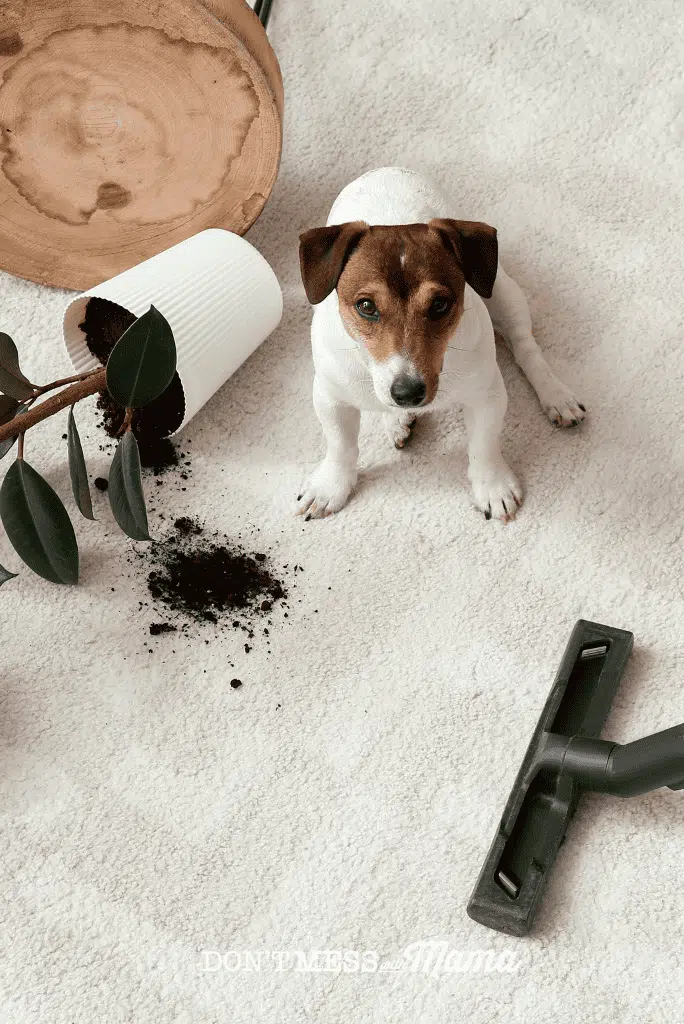
How to Clean Carpet Smells Naturally
Now you’ve narrowed down the source of your smelly carpet, it’s time tackle it naturally. From DIY carpet deodorizers to natural cleaning tips these are the most effective ways to keep your carpets looking and smelling their best.
It’s worth noting that while these methods are generally safe for carpets and most fabrics, I’d always recommend testing a small, inconspicuous area before applying to the entire stain.
1. Vacuum Regularly
Regular vacuuming is a crucial first step in maintaining clean and fresh-smelling carpets. Not only does it remove dirt and debris, but it also helps to deodorize your carpet. Over time, carpets can accumulate various odor-causing particles, such as pet dander, food crumbs, pollen, and dust. By regularly vacuuming, you’re not only removing these allergens and pollutants but also improving the overall air quality in your home.
Carpets can also be a breeding ground for bacteria, especially in areas with high foot traffic or where spills occur. Bacteria can produce unpleasant odors, contributing to a smelly carpet. Vacuuming regularly is one of the easiest ways to help reduce this.
Vacuuming also helps to rejuvenate the carpet fibers, making them stand upright again. As a result, the carpet looks fresher and feels softer, which can help eliminate any musty or stale odors that may be lingering.
2. Baking Soda
Baking soda has many uses, including being one of the best DIY carpet deodorizers. In fact, it’s the star of the show in my homemade carpet freshener recipe. When sprinkled onto the carpet, baking soda absorbs and traps odorous molecules as well as excess moisture. This absorption process helps eliminate unpleasant smells, including pet odors, food spills, smoke, and musty scents.
Baking soda is safe to use on most carpet types and is non-toxic, making it a popular choice for those wondering how to deodorize carpets naturally.
Simply sprinkle on the affected area (or all over for a full freshen up) and let sit for around 30 minutes then vacuum.
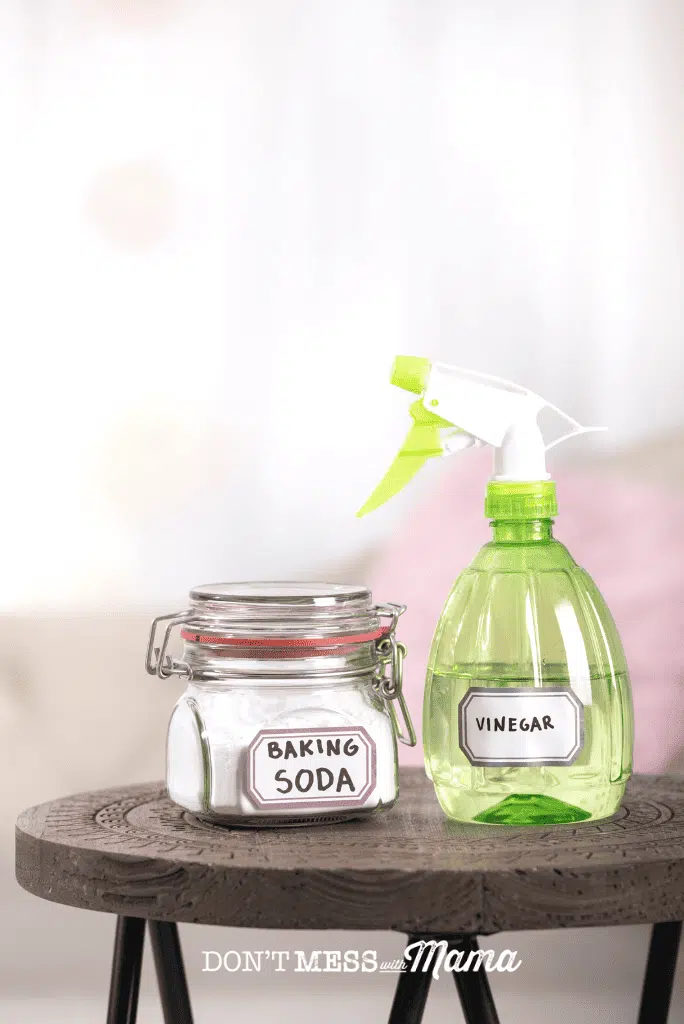
3. Borax, baking soda + add essential oils
Combing borax with baking soda helps to pack a little more punch on particularly tough stains such as grease, oil, coffee, wine or pet urine. Start by vacuuming the carpet thoroughly to remove loose dirt and debris. Then, in a bowl, combine equal parts borax and baking soda. Borax helps to kill bacteria and remove stains, while baking soda acts as a natural deodorizer.
Add a few drops of essential oil to the mixture. Essential oils like lavender, lemon, or tea tree oil can provide a pleasant fragrance and also have.
Stir the mixture well then sprinkle liberally over the affected area. Use a clean brush to work the mixture into the carpet fibers then let it sit for at least 30 minutes, or ideally overnight. This allows the mixture to deodorize the carpet and penetrate the fibers to remove the stain. Finally, vacuum the carpet again to remove the powder mixture, along with the trapped odors and dirt.
4. Deep clean every 6 months
I recommend deep cleaning your carpets every 6 months to increase their lifespan and keep on top of odors and bacteria. I like to deep clean my carpets as part of my Spring cleaning checklist, then again in Winter; as we’re spending more time indoors, build-up is more likely.
I find that steam cleaning is the most cost and time-efficient way to do this. As well as a faster drying time, steam cleaning can penetrate deep into the carpet fibers, reaching dirt, allergens, and embedded stains that we can’t see on the surface. The high-temperature steam also helps to loosen and dissolve contaminants, helping to sanitize and deodorize your floor.
Steam cleaning can also be done without the use of harsh chemicals, making it safer and more environmentally friendly. Instead of using the carpet shampoo that comes with the steam vacuum cleaner, opt for a natural solution instead. I use Thieves Household Cleaner concentrate (2 capfuls) and hot water and fill to the water line in the steam cleaner.
Once finished, don’t forget to use fans and open windows to dry your damp carpets quickly.
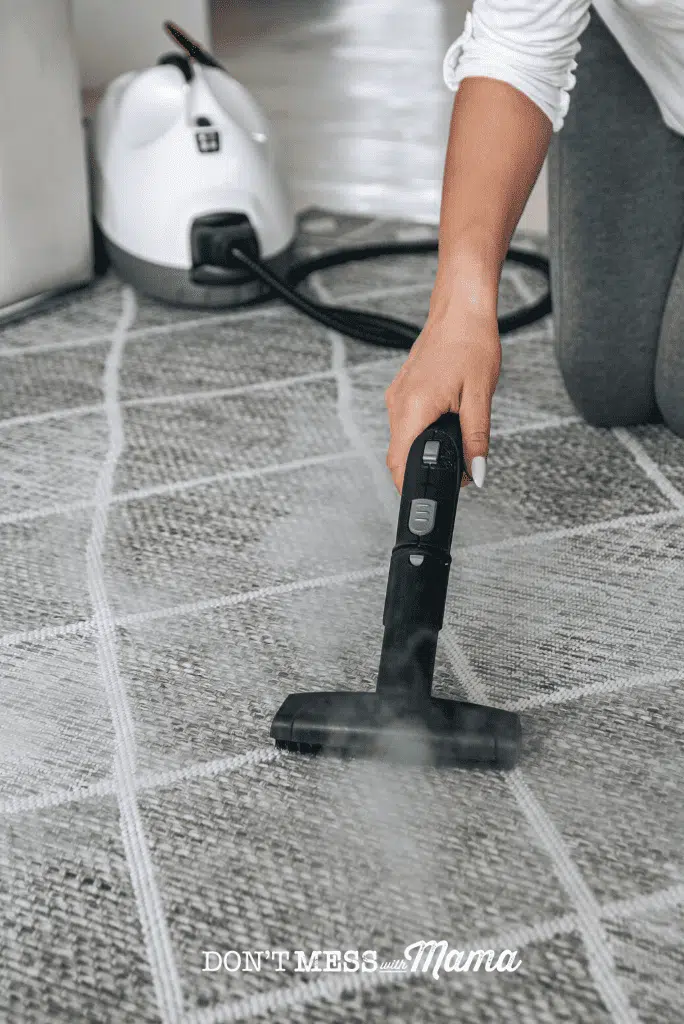
5. Spot Clean
Spot cleaning targets and treats specific stains or small areas instead of cleaning the entire carpet. To spot clean, you typically blot the affected area with a clean cloth or sponge using a suitable cleaning solution or mixture, depending on the type of stain or odor.
I found one of the most effective and affordable ways to spot clean is using baking soda and vinegar. Make a paste using equal parts vinegar and baking soda, and then mix the paste with warm water to create a paint-like consistency. Use an old toothbrush to scrub the paste onto the stain. Then, use warm water to clean the area with a cloth or sponge.
Spot cleaning is beneficial for neutralizing carpet odors because it directly addresses the source of the smell, effectively breaking it down and removing it from the carpet fibers. This targeted approach saves time and resources – perfect for when you need a cheap but powerful quick fix.
6. Enzyme cleaner
One of the most effective methods for carpet odor removal is an enzyme cleaner. This powerful solution is specifically designed to tackle stains and odors caused by organic matter such as pet accidents, blood, or vomit.
It’s important to note, different enzyme cleaners are designed for specific types of stains. Once you have found the best type for your stain, apply it directly to the affected area. Always follow the instructions provided by the manufacturer for best results. As a tip, some enzyme cleaners may require more time to work effectively. The duration can vary depending on the type and severity of the stain or odor.
Once applied, the enzymes in the cleaner start to work. They attach themselves to the molecules responsible for the stain or odor and break them down into smaller fragments. After the enzymes have done their job, those remaining smaller fragments are typically odorless. You may need to blot or gently scrub the area to help lift the stain and aid the carpet odor removal.
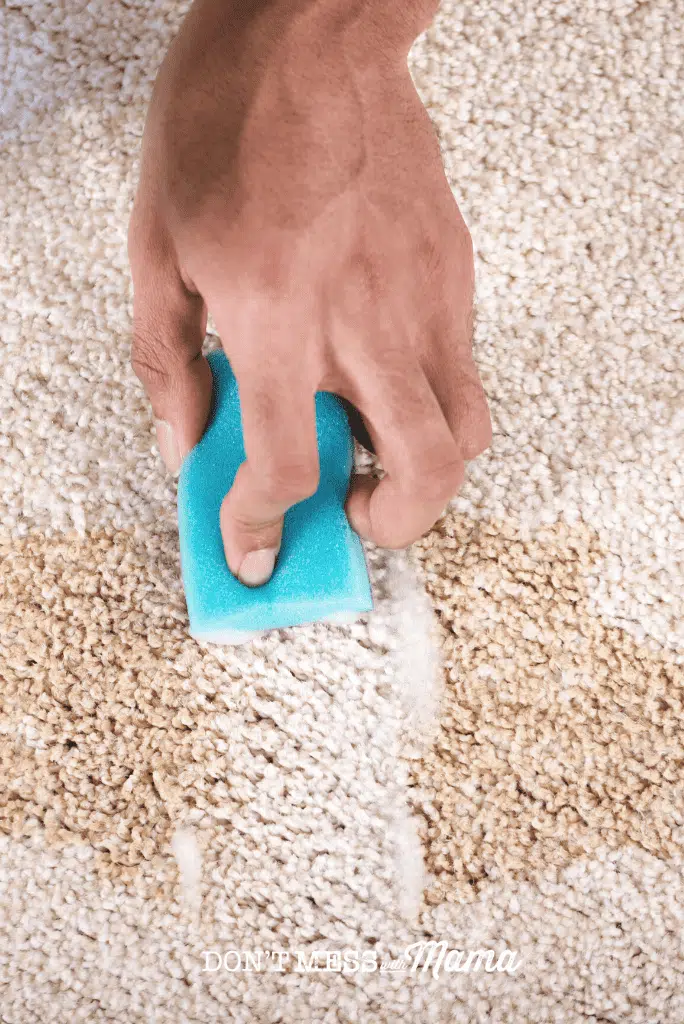
7. White Vinegar
While there are some things you should never clean with vinegar, it is one of the best solutions for those struggling with how to get a musty smell out of carpet.
For a homemade odor remover, try using a vinegar solution. Simply mix 1 part of white vinegar with 2 parts warm water and add to a clean spray bottle. Vinegar’s acidity helps neutralize odors, leaving your carpets smelling fresh. If you find the vinegar smell too strong, you can add a few drops of essential oils to the solution.
I’d recommend testing on an inconspicuous area of your carpet first, like in a closet. Then spray on carpeted areas with musty or mildew smells. Allow the area to dry, and then vacuum. Reapply as needed.
8. Vodka
Vodka is another affordable and easy way to deodorize and clean carpets naturally. It is most effective in neutralizing organic odors, such as those caused by pet accidents, mold, smoke, or food spills. The alcohol content in vodka helps break down and evaporate odor-causing compounds, which is why it’s the main ingredient in my Homemade Febreeze.
You can also apply it straight onto carpet to remove stains. It’s particularly effective against stains such as wine, grass, grease, coffee or soda.
- To remove a new stain: Simply soak a clean cloth in vodka, then use it to blot the affected area. It’s vital to act quickly. The sooner you treat a carpet stain, the more success you’ll likely have.
- For set-in stains: If it’s a tougher stain, apply the vodka directly and scrub using a clean brush. Don’t forget to test before opting for either method to ensure you won’t damage your carpet.
As a tip, any kind of vodka will do so save the good stuff for your cocktails and use any cheap brand for cleaning.
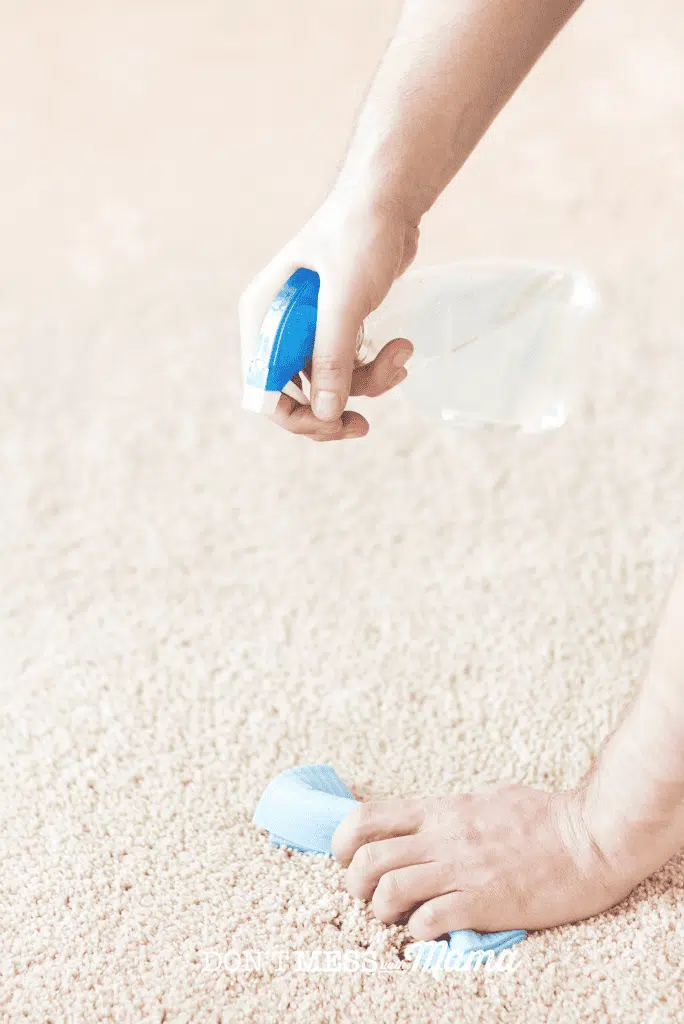
Best Essential Oils for Carpet Odor Removal
Although vodka and vinegar are wonderful at deodorizing carpets naturally, it’s no secret they don’t smell too great. That’s why I prefer to add a few drops of essential oils that are also known for their deodorizing properties. Not only will they help freshen up your carpets, but they mean you can avoid using synthetic fragrances or toxic air fresheners.
Here are some of the best types of essential oils to use for deodorizing carpets:
- Lavender: Lavender essential oil has many uses and is renowned for calming, floral scent. It can help neutralize odors and leave a refreshing fragrance in the carpet.
- Purification: Made with citronella, rosemary, lemongrass, tea tree, lavandin, and myrtle essential oils, this blend is very effective in purifying and removing odors for carpets, laundry, etc. I find it’s also ideal for a DIY shoe powder to deodorize those stinky sneakers.
- Lemon: Lemon oil is one of my favorite essential oils for cleaning as it has a citrusy and invigorating aroma and is known for its antibacterial properties. This means its perfect for helping to eliminate unpleasant odors, particularly those caused by pets or food spills.
- Tea Tree: Tea tree oil has strong antimicrobial properties. It can help combat bacteria, fungi, and mold that may contribute to carpet odors. This means it’s one of the best essential oils if you’re struggling with a musty-smelling carpet.
Carpet Powder vs. Carpet Spray
Carpet powder solutions such as borax or baking powder are best for deodorizing a large area. Whereas carpet deodorizing sprays are best for small stubborn stains and spot cleaning.
- To use powder deodorizing solutions: Sprinkle over the carpet, leave for at least 30 minutes (ideally overnight.) If you’ve applied to a wet carpet, make sure the powder is dry before vacuuming to avoid damaging your vacuum.
- To use carpet deodorizing spray: For example, vodka or vinegar-based spray solutions, always test first, then if it is safe to do so, spray the affected area. Blot with a clean cloth or brush and allow to dry. Vacuum as normal.
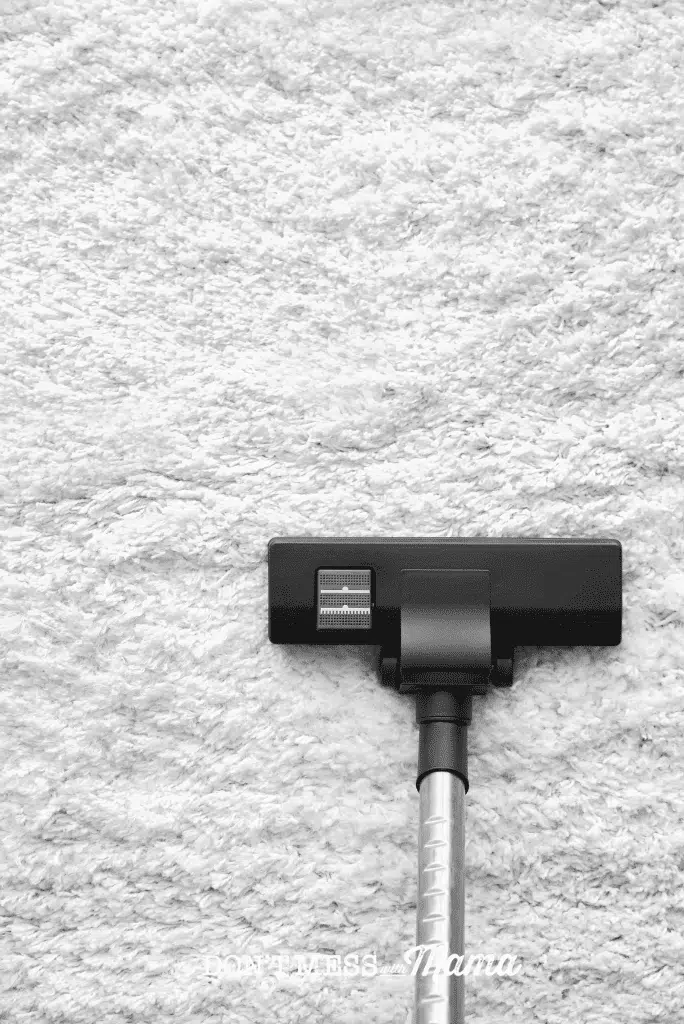
When to Get Carpets Professionally Cleaned
While these natural remedies can work wonders, sometimes professional cleaning is necessary, especially if the odor persists or the carpet material is delicate. Professional carpet cleaners have the expertise and equipment to deep clean your carpets, removing even the most stubborn smells.
When choosing a professional carpet cleaner for a family home, it’s important to prioritize that they use natural methods and safe cleaning products. Some may even hold recognized “green” certifications that shows affiliations with eco-friendly organizations.
Always ensure their cleaning products are specifically designed to be safe for pets and children and do not contain strong odors or toxins. A reputable professional will be open and honest about their methods and products so should be willing to answer any of your questions and concerns.
For peace of mind, double check they are licensed and insured. This protects you and your property in case of accidents or damaging which can happen. Finally, check for reviews and references. I find positive reviews regarding their use of natural methods and safe ingredients can be reassuring.
Top Tips to Clean Carpet Smells Naturally
- Before attempting any deodorizing or deep cleaning methods, it’s crucial to start with a thorough vacuuming. This step helps to remove loose dirt, dust, and debris, preparing the carpet for a better chance of success.
- If you’re struggling with wet carpet smells or moldy odors, it’s essential to address the root cause of the issue. Dry out the carpet as much as possible, ensuring proper ventilation and fresh air circulation. Moldy odors can be a sign of underlying water damage, so it’s important to tackle the issue promptly to prevent further problems.
- These solutions can also be used for carpet in your car and rugs.
- Don’t worry about vacuuming powder such as baking soda or borax. In fact, they can even help deodorize your vacuum too.
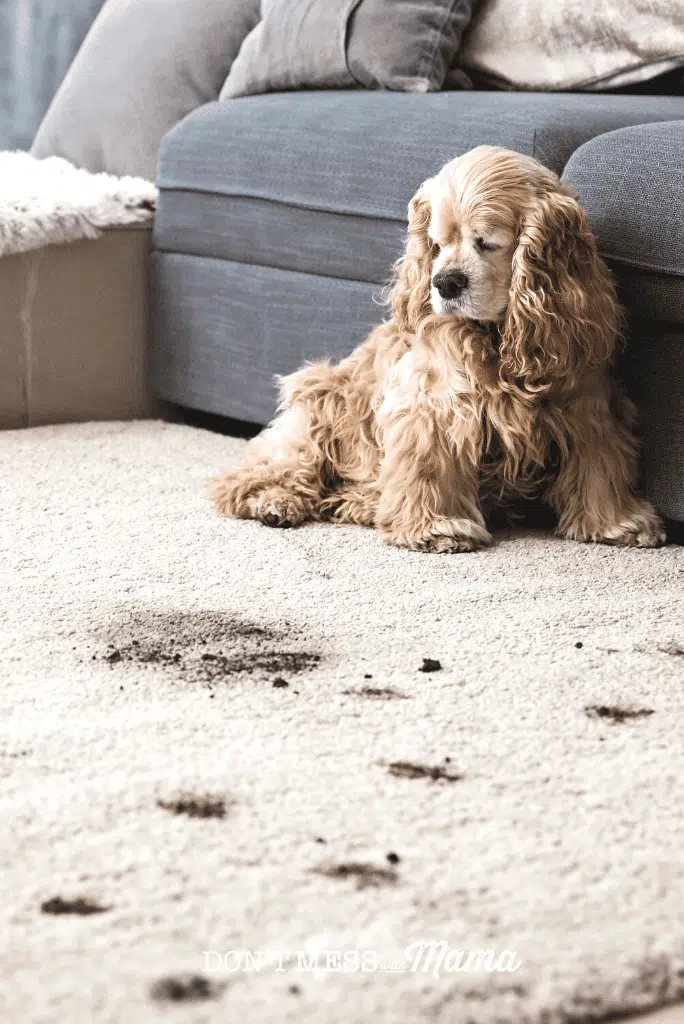
More Posts You Might Like
- 10 Natural Cleaning Hacks for a Chemical-Free Home
- 7 Toxic Household Cleaners to Avoid
- How to Make Your Own Cleaners – 10 DIY Cleaning Recipes
- How to Clean and Organize Your Fridge
Did you try these natural solutions to deodorize your carpet? Don’t forget to comment below to let me know how it went. You can also FOLLOW ME on Facebook, Instagram and Pinterest.
